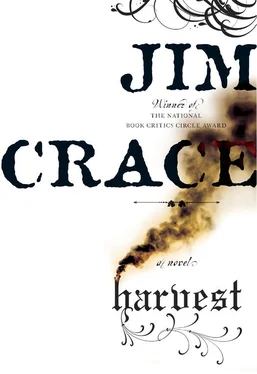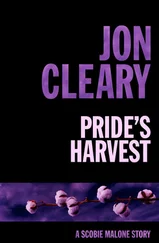I hesitate. I ought to hurry across the yard and comfort them. I might even give them hope. I would not want them to travel out before first understanding that soon, thanks to Master Kent’s interventions, for which I am to some extent the ransom price, they will be freed, to walk afar, untethered, in another place. But I’m afraid, and I’m too shocked by them to move. It’s not that they are wounded like the groom, not visibly, at least. It’s just that they are not the women I have known. And Lizzie Carr is not the girl. She still wears her green sash, surprisingly. She has it tied round her throat. It’s dirty now, I see, and torn. It might be bloody, in fact. But I am reminded briefly of how she once appeared, that little nervous scrap, exhorted by my master to step out of the chair of hands provided by her father and her uncle John and find a single grain, “just one. Then we will cheer. And you will be our Queen for one whole year.” She’d been the sweetest and the yellowest that ancient day. I’ll not forget her blowing on the grains to winnow off the flake and how the barley pearls were weighty on her palm. But now she is like chaff herself. A sneeze could lift her up and take her off. She’s hollowed out and terrified. What can it mean to her that she is being fastened to the saddle of a horse? What can it mean to Kitty Gosse and her friend Anne, the piper’s mother, who cannot know her son has abandoned her and taken all the other Rogerses with him, that the only neighbor here today is Walter Thirsk, who’s skulking in the shadows with a bruise across his face?
I can’t deny it’s cowardly, but, now that the horses have been taken off my hands, I am free to edge along the slice of shadow, doing what I can not to catch anybody’s eye again, and find some refuge in the open lane. My master Kent has had the same idea. He does not want to take part in the packing for departure, the tying and the stirruping. I find him dressed for travel in his high hat and long topcoat, staring out across the fields, with his back pressed against a maiden elm, its warped feet bright with lichen and its craggy trunk already warm with light. I’ve seen him in this place a hundred times, a pipe in hand, belonging here. We all have somewhere private hereabouts where we can press our backs. Today — such is the light, and such the sap green of his coat — he looks as if he’s part of it, a man of wood and leaf.
“This land,” he says, gesturing, “has always been much older than ourselves.”
I do not take his meaning straight away. I nod respectfully, expecting him to say more, when he’s found the words.
“So much older than ourselves,” he repeats in a whisper, shaking his head. “Not anymore.”
I understand his meaning now: this ancient place would soon be new, he wants to say. We’re used to looking out and seeing what’s preceded us, and what will also outlive us. Now we have to contemplate a land bare of both. Those woods that linked us to eternity will be removed by spring, if Master Jordan’s saws and axes have their way. That grizzled oak which we believe is so old it must have come from Eden to our fields will be felled and rooted out. That drystone wall, put up before our grandpas’ time and now breeched in a hundred places, will be brought down entirely and replaced either with an upstart thorn or with some plain fence, beyond which flocks will chomp back on the past until there is no trace of it. We’ll look across these fields and say, “This land is so much younger than ourselves.”
My master takes his leave from me. We have embraced already this morning, in the orchard, beneath the apples and the hawks, and we are wise enough to let that parting serve. We could not better it. He does not even offer me his hand, but only puts a finger on my arm, and fixes me with the briefest show of eyes, as wide and white as they can be — he means me to remember this look; he means me to decipher it — before he turns toward his house, the house, his cousin’s house, and for the first time in a dozen years prepares to ride a horse other than Willowjack.
I find that I am running up the incline of the common fields toward the top end of our land, the one place where it is high enough to gain a pinched view of other parishes, that little clovered hillock which on Mr. Quill’s rough map marks the nose of the brawny-headed man which I now know to be our village from above. It’s just as well that I am on the move because I have an excuse to count my tear-filled eyes as proof of nothing more than my exertion. I am a man not used to moving fast. I can’t recall running for such a distance since I came to this village. There never was a need to hurry here. We value effort over haste. I half expect to hear my neighbors calling out, “What’s bitten your backside, Walt?” or “Where’s the fire?” or “Who the devil’s chasing you, for doing what?” They’d wonder at my weeping eyes.
I’m glad to sit and rest my lungs and legs on Clover Hill — now, there’s a name that Mr. Quill might like — until the travelers pass by. I’ve climbed up here because I know there is a stretch of lane where for, say, fifty paces, there are no hedges, trees or walls to curtain it from my view. I used to come here often years ago, before I settled in — yes, settled in; yes, fitted in; I can’t honestly say belonged —hoping I suppose to be the first to spot a visitor, some enterprising carter, say, a tinker with his colored and deceitful wares, a relative of Master Kent’s, perhaps (How could I know what that might mean for us?), some minstrel with a bag of songs and news of towns and palaces. But no one ever came to stay more than a day, of course. Not till this week, that is.
Now, I rest my arms across my knees, put my chin onto my wrists and allow the sun to dry me out. I am expecting cousin Jordan’s party soon. Until it comes, my master’s leaving, fixing stare is coaxing me. It shows wide and white again in my mind’s eye. I’ve not seen his face like that before, so mimed and meaningful. It was an accusation of a sort, I fear. A plea, as well. Yet it was fond, in its own way. My Cecily would sometimes bulb her eyes like that. Hers was a wifely nudge that meant there was a duty to be carried out, by me. Or else it was a warning that I had said too much, or gone too far, or not gone far enough. The eyes speak louder than the lips, it’s said — and they gather whispers better than the ears. My master’s final, whispered words—“Not anymore”—are coaxing too. His voice is quivered like a dove’s in this morning’s sun-stoked breeze, as if, far off, he’s cooing out to me. His voice is billowy, a sobbing parley in the wind, vabap-vabap. I catch only a gust or two. But I can tell it is a call to arms. It says that there are duties to be done. It says I haven’t yet gone far enough.
The cousins are riding at each other’s shoulders when they pass. I almost pick up their conversations. Even from this distance I can tell they are not ordinary men. I suppose their hats betray their standing. A workingman would never wear or even need to own a tall and heavy hat, or one with so deep a brim. Such hats belong to gentlemen who rarely need to bend their heads or swing a tool. A workingman could not afford to pass his day with so straight a back and so erect a head. It is as if these first two riders are suspended from their hats. All their wearers have to be is pendulous.
It’s disappointing to see how cousinly they are, my twin masters now. It would have made me happier, it would have helped my quandary, to see them riding far apart, not ear to ear. They are as close as two cloaks hanging from a pair of pegs. I cannot bear to think that they are friends or that there could be any liking between them. Blood is thicker than water, of course, and families are bound to observe truces which would not be kept outside the ties of kin. But the only blood these two have shared in common is Lucy Kent’s. The thread that links them is a flimsy one. Their seeming fellowship this afternoon is baffling.
Читать дальше












